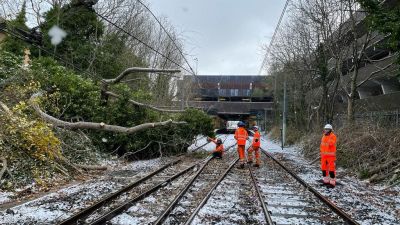'Miracle' to have Tyne and Wear Metro trains running after Storm Arwen's trail of destruction

Metro staff "worked a miracle" to get train services back running after the trail of destruction left by Storm Arwen.
The fierce 90mph winds over the weekend brought trees crashing onto train tracks, downed overhead power lines, and left debris strewn across the Tyne and Wear rail network.
All services were shut down from Friday night and throughout Saturday because of the "unprecedented" damage, before gradually being restarted on Sunday - though there are still no trains running between Park Lane and South Hylton in Sunderland while Network Rail carries out repairs.
Workers have been praised for their tireless efforts in horrendous weather conditions to ensure that most commuters would be able to get to work on Monday morning.
Metro operator Nexus confirmed that its staff had to remove fallen trees or branches from the tracks at Regent Centre, Byker, Hadrian Road, Ilford Road, Fawdon, and North Shields, plus deal with damaged fences at Callerton and Bank Foot.
Nexus' chief operating officer, Martin Kearney, described the colossal clean-up job as "our biggest ever recovery operation" in the Metro's 41-year history.
He said: "My thanks go to our customers for their patience during that period of major disruption. And my thanks go to all of our employees who have worked so hard, both during and after Storm Arwen had hit.
"The big challenge was having to undertake repairs at so many different sites," he continued.
There were fallen trees at seven locations and it caused power lines to be torn down. In some instances more than just one tree had fallen onto the tracks.
"Resources were stretched like never before."
At a time of major uncertainty over the Metro's future funding, Mr Kearney said that new cash to keep on top of potentially dangerous trees next to tracks was a "key part" of what officials are calling for from the government.
Nexus is predicting a financial shortfall of more than £20 million next year as a result of the government's bailout funding that has kept trains running during the Covid crisis, when passenger numbers and the resulting ticket income have dipped significantly, being due to end from next April.
Ministers have been urged to agree to continue the funding or leave North East bosses needing to make cuts to public transport.
Mr Kearney added: "The storm led to an unprecedented number of trees falling across Metro lines.
"We are already in discussion with the Department for Transport about the future funding required for Nexus to continue to maintain and renew Metro's infrastructure, and the way we manage vegetation forms a key part of that ask, so we can ensure that ageing trees do not undermine the safe and reliable operation of our system.